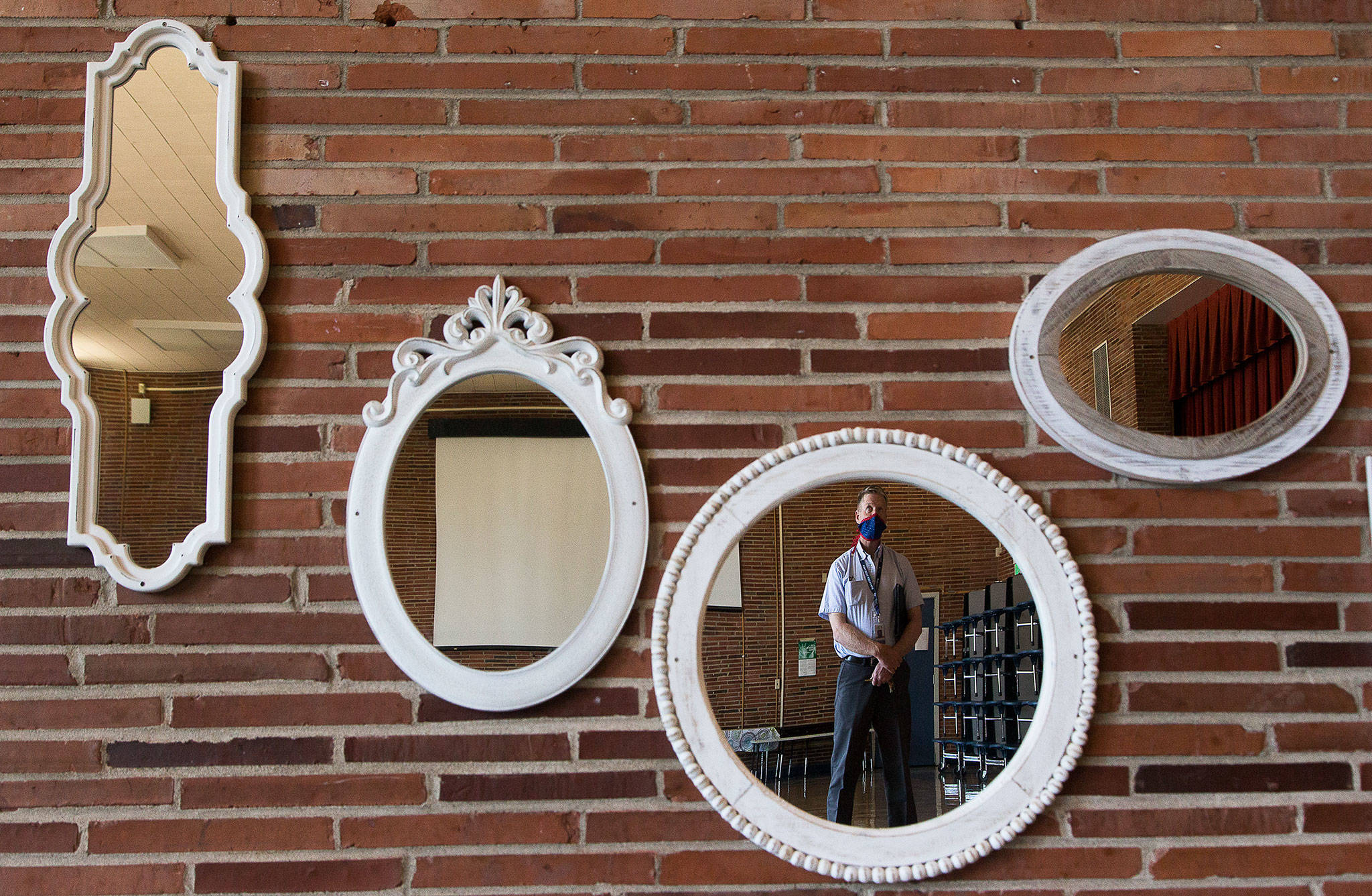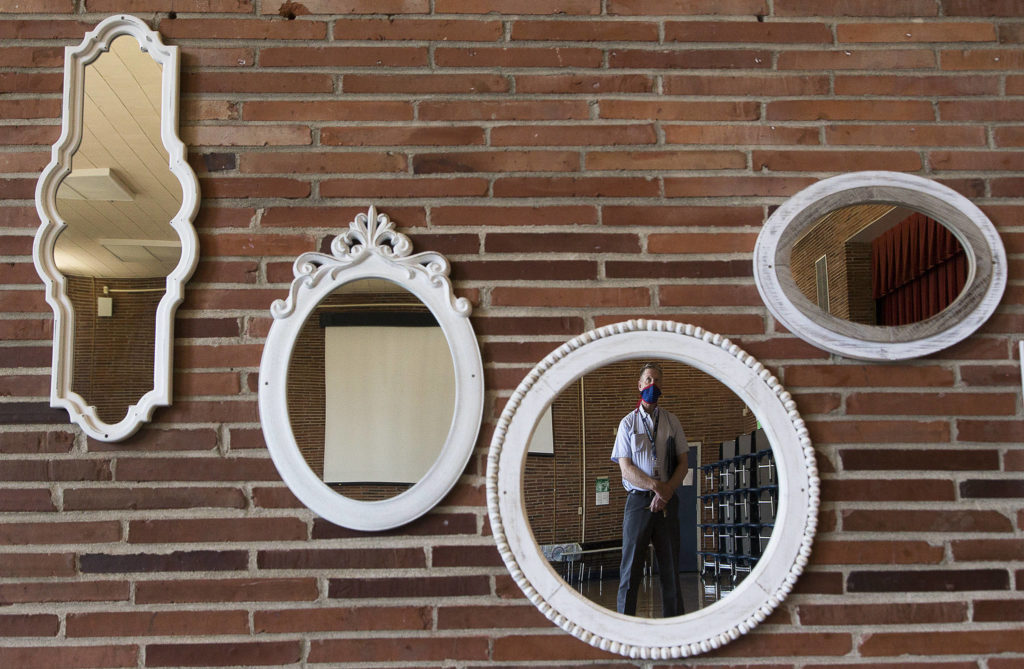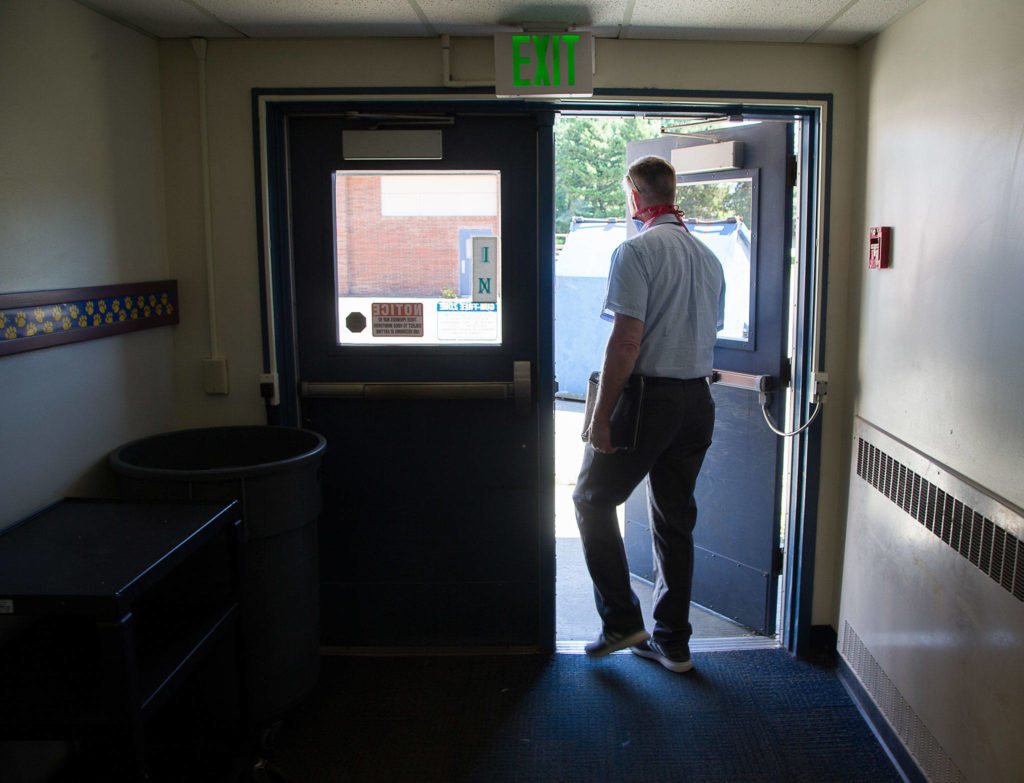EVERETT — When Madison Elementary welcomed its first students in 1947, the newest campus in the Everett School District had seven classrooms and an air of freshness associated with a brand new campus.
Seventy-three years and three additions later — the last in 1991 — the number of classrooms have tripled and the ailments of the aging institution have become apparent.
There is not enough space to accommodate both a growing student population and pressure for smaller classes.
Its unreinforced masonry construction makes it vulnerable in a major quake.
And the design of the ventilation system for conveying air and heat to classrooms may be susceptible to spreading germs and, potentially, the coronavirus.
Madison Elementary, along with similarly age-challenged Jackson and Lowell elementaries, could each be razed and replaced with brand new buildings if voters approve Proposition 1, a $317.4 million bond measure on the Aug. 4 ballot.
The measure also contains money to construct new classrooms, make renovations to bolster STEM (Science, Technology, Engineering and Math) programs at each of the district’s three high schools, add playground equipment at eight elementaries, improve security systems, and replace the synthetic turf and track at Memorial Stadium.
“This bond is going to create a lot of opportunities,” said Superintendent Ian Saltzman.
To pass, it must garner at least 60% of the vote. It’s a high bar — one the district didn’t reach in 2018 when it put forth a $330.6 million measure.
And this year they’re trying to win over an electorate dealing with stresses, strains and uncertainties associated with the COVID-19 pandemic.
District leaders say they want to make voters aware schools have been active in this public health crisis, even when shuttered, by providing students with meals, Chromebooks and hot spots for wireless connections, and hosting child care for children of first responders and health care workers.
“There is no road map for what’s happening,” said Caroline Mason, president of the district’s Board of Directors. “We hope people realize the role schools play in the middle of a pandemic.”
Opponents contend the measure will not ease overcrowding — which district leaders have said is a serious issue — because there’s no money to construct brand new schools, only replacements.
They say the district is understating the long-term tab for property owners and not taking into account the financial impact of the state’s boost in the property tax to fund public schools as a result of the McCleary lawsuit.
And a vote on the measure is poorly timed, opponents said, coming amid a public health crisis that’s brought economic insecurity to many individuals and families. It should have been pushed off until 2021, they said.
“The bond proposal before you was composed roughly one year ago under the assumption that we would continue to have a stable economy, heavy population growth, steady or rising property values, and ever-increasing enrollment. Then this past spring the Covid-19 pandemic struck us, and none of these assumptions are valid anymore,” residents Rodman Reynolds and Jeff Heckathorn wrote in their argument against the measure in the voter’s pamphlet.
Heckathorn also created a website, www.SchoolBondProsCons.com, with detailed counter arguments to information put out by the district and the political committee working to pass the bond.
“While there are some worthy maintenance items in the proposed bond, the bond is simply too much at once and needs to be scaled down to the most pressing items,” he writes. “Taxpayers are still in shock after the recent McCleary Decision which pumped billions into the K-12 school system from our state school property taxes.”
The district, he said, “needs to start making better decisions, start being frugal, and needs to stop overspending at every opportunity.”
Making of a bond
Conversations on this year’s bond began almost immediately after the last effort failed in February 2018. That was a much different measure primarily because roughly two-thirds of the money was penciled in for construction of a new high school.
Rather than put the same measure in front of voters a second time in 2018, the Board of Directors asked a citizens committee to develop another proposal.
The 25-person panel toured campuses and met several times. When it submitted its recommendations last summer, the pricey centerpiece of the failed measure didn’t make the cut. It had been at the top but dropped off, partly due to what they viewed on campuses and partly because a redrawing of the attendance boundaries for the existing high schools lessened the pressure for constructing a new one.
What voters now see in Proposition 1 is a measure that will make investments in pretty much every existing school.
“I believe the package is so much more equitable,” Mason said.
A major element is tearing down the three elementaries. Each would be replaced with new two-story buildings on the same property. Each school would serve the same number of students as they do now. Combined, this work accounts for about $165 million of the bond receipts.
There’s $17.9 million for retooling the three-story vocational building at Everett High School into a home for the district’s career pathway program focused on medical and health careers. Another $27.6 million is listed for redoing the cafeteria building to renovate the kitchen on the third floor as well as classrooms on the lower floors. There’s also money for a partial renovation of the science building.
Other big pieces include:
• $33.8 million for the addition of 36 elementary classrooms spread among eight campuses. This had been part of the 2018 bond proposal.
• $17.8 million for modernizing the Cascade High School science building to house a career pathway program for aerospace and advance manufacturing.
• $4 million to outfit several classrooms at Jackson High School with high-end computers and audio-visual equipment, as part of the district’s career pathway program in information and communication technology. This and the Cascade High project were part of the 2018 bond proposal.
• $2.1 million for new playground equipment at Silver Lake, Madison, Penny Creek, Garfield, Jackson, Lowell, Mill Creek, and Emerson elementary schools.
• $2.4 million to replace the synthetic turf and track at Memorial Stadium.
• $1.7 million to completely redo the drainage for the Cascade High School softball field and to make other improvements including construction of new covered dugouts.
Under the proposal, the tax rate paid by property owners will not rise in the next four years — the district predicts it will dip a dime per each $1,000 of assessed value — as older debt is paid off.
Heckathorn said the rate is only a piece of the tax puzzle. If a property’s assessed value rises, the owner’s overall tax bill will increase which means they will be paying more to the district.
“Focusing only on the tax ‘rate’ is disingenuous at best,” he writes on his website. “It fails to acknowledge how assessed property values (homes, apartments, businesses) have increased and how the actual taxes taxpayers pay every year have dramatically increased.”
Mason disagreed strongly with opponents’ claim that the measure will not relieve overcrowding. With 58 new permanent classrooms, fewer students will be in cramped portables.
“We have so many elementary students in portables. It is just an unideal situation,” she said. And the projections of future growth in the student population haven’t changed, in spite of critics’ assertions, so the work should not be postponed.
Another issue — not directly related to the bond — are pay raises that the board awarded to school and district administrators. Saltzman did not take his.
Opponents criticized the move, saying the district should follow the path of many businesses and local governments that are cutting their payrolls because of the economic downturn.
Mason said the raises “were planned before the pandemic” and directors wanted to honor their commitment.
Teachers got large salary boosts as part of the McCleary case and the raises were in part to keep pace with those, she said.
Not their first choice
A vote on the bond measure had been set for the April special election. But the spread of COVID led to cancellation of the election. After some discussion, the board opted to proceed in the primary knowing it draws a larger electorate, thus making it harder to reach the 60% bar.
“I’m very hopeful that the support of our community is there,” Saltzman said. “We are going to open schools one day and we do need this for our kids and our community.”
District teachers are strong backers, too, as they stress the benefits of creating both a better environment for learning and new construction jobs.
Teacher unions, local and statewide, account for nearly a third of the $66,000 cash and in-kind contributions raised for the campaign.
“All students deserve a great school that inspires their learning,” said Jared Kink, who is president of the Everett Education Association and has children in Everett public schools. “Voting for a bond is taking a long-term view. This is planning for the future.”
Jerry Cornfield: 360-352-8623; jcornfield@heraldnet.com. Twitter: @dospueblos.
Talk to us
> Give us your news tips.
> Send us a letter to the editor.
> More Herald contact information.



























